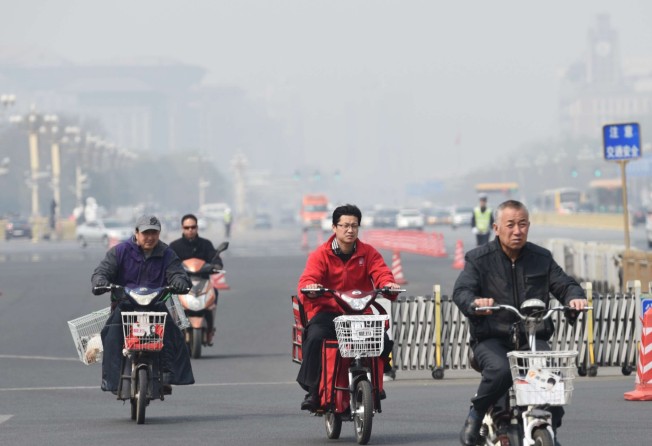Disservice to the people: the problem with China’s e-tailing taxes and bans on electric bikes
Higher taxes on cross-border e-commerce and limits on electric bicycles get in the way of a balanced economy and the ability of the poor to make a living

Mainland officials take great pride in preaching that the government is there to “serve the people” but many of their policies only end up getting in the public’s way.
The two latest examples involve the change in taxes on online retail sales of overseas consumer goods and the decision to restrict the use of – or even ban – electric bicycles in major cities.
Those changes have caused widespread discontent and confusion among ordinary mainlanders. The decision on electric bikes is particularly harmful to the poor and goes totally against the government’s stated policy to promote green energy and cut pollution.
On Friday, the mainland changed tax rules so that online purchases of overseas consumer goods through cross-border e-commerce platforms are no longer classified as personal postal items but as imported goods subject to tariffs, value-added tax and consumption tax.
Personal postal articles carry a flat tax rate of 10 per cent if they are worth less than 1,000 yuan (HK$1,200). In the past, online purchasing agents repackaged products for mailing to take advantage of these lower taxes, undercutting traditional importers who have to pay much higher rates on the goods they bring in. The change will affect more than 5,000 e-commerce platforms, including those operated by Alibaba Group, which owns the South China Morning Post.
Officials claim the new rule is aimed at levelling the playing field for e-commerce platforms and traditional retailers and importers, but it’s more about what they see as “lost revenue” because of a booming industry.
Cross-border e-commerce has clocked up double-digit annual growth since 2008 and its expansion has remained robust despite a slump in foreign trade.
The Ministry of Commerce predicts the volume of cross-border e-commerce will reach 6.5 trillion yuan this year and account for 20 per cent of the country’s foreign trade in a few years’ time.
But while the tax change may add to tax coffers amid the economic slowdown, it could do more harm than good. It is widely expected to dampen consumer spending and, more importantly, the development of e-commerce, a sector the central government has repeatedly pledged to support. Indeed, as the authorities try to rebalance the economy from exports and investment to consumption, it should be cutting taxes and tariffs on imports to boost consumer spending, not raising them.
If the tax change is controversial, the decision to limit the use of electric bicycles is outright ridiculous.
From today, electric bikes are banned on 10 major Beijing streets, including those around Tiananmen Square. Shenzhen, Guangzhou, and other major cities have also banned or restricted the use of electric bikes.
The argument is that riders of electric bikes often violate traffic rules by competing with cars on the road and running red lights, thus becoming a major source of accidents and fatalities.
In particular, the authorities have criticised bikes with motors that exceed the approved design speed of less than 20km/h and maximum load capacity of 40kg, saying they go too fast in bike lanes.
But the argument does not have a leg to stand on. There is no legal basis for those cities to restrict the use of electric bikes because they have the same rights to the road as any other vehicle. If the authorities believe motorised bikes exceed approved design speeds, it should punish the manufacturers and retailers instead of the users.
China has come a long way since the late 1980s, when pedal bikes were the main form of transport. These bikes started to disappear as the country entered the motor age and became a major car market. But over the past few years, electric bikes have gained widespread popularity in major cities mired in traffic jams and smog.
They are particularly popular among the poor who cannot afford cars, and migrant workers who work as couriers.
But these road users have to compete with motorists because the authorities have encroached considerably on the originally wide bike lanes to make way for cars. More often, riders are forced to use car lanes, resulting in accidents.
But this is no reason to ban electric bikes. As the experience of many other countries like Sweden has shown, the mainland should encourage the use of bikes, traditional or electric, to help cut back on cars and smog.
Furthermore, depriving the poor of a means to make a living is simply wrong.